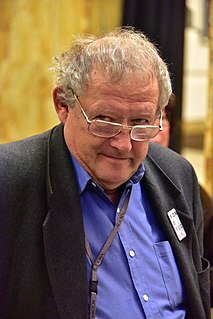A Quote by Sam Harris
Faith drives a wedge between ethics and suffering. Where certain actions cause no suffering at all, religious dogmatists still maintain that they are evil and worthy of punishment. . . . And yet, where suffering and death are found in abundance their causes are often deemed to be good. . . . This inversion of priorities not only victimizes innocent people and squanders scarce resources; it completely falsifies our ethics.
Quote Topics
Abundance
Actions
Be Good
Between
Cause
Causes
Certain
Death
Deemed
Drives
Ethics
Evil
Faith
Found
Good
Innocent
Innocent People
Inversion
Maintain
Often
Only
Our
People
Priorities
Punishment
Religious
Religious Dogma
Resources
Scarce
Scarce Resources
Still
Suffering
Suffering And Death
Wedge
Worthy
Related Quotes
A nominal Christian often discovers in suffering that his faith has been in his church, denomination, or family tradition, but not Christ. As he faces evil and suffering, he may lose his faith. But that’s actually a good thing. I have sympathy for people who lose their faith, but any faith lost in suffering wasn’t a faith worth keeping.
The world is full of suffering. Birth is suffering, decre- pitude is suffering, sickness and death are sufferings. To face a man of hatred is suffering, to be separated from a beloved one is suffering, to be vainly struggling to satisfy one's needs is suffering. In fact, life that is not free from desire and passion is always involved with suffering.
Suffering is universal; how we react to suffering is individual. Suffering can take us one of two ways. It can be a strengthening and purifying experience combined with faith, or it can be a destructive force in our lives if we do not have the faith in the Lord's atoning sacrifice. The purpose of suffering, however, is to build and strengthen us.
Within the framework of the Buddhist Path, reflecting on suffering has tremendous importance because -realizing the nature of suffering, you will develop greater resolve to put an end to the causes of suffering and the unwholesome deeds which lead to suffering. And it will increase your enthusiasm for engaging in the wholesome actions and deeds which lead to happiness and joy.
To draw an analogy: a man's suffering is similar to the behavior of a gas. If a certain quantity of gas is pumped into an empty chamber, it will fill the chamber completely and evenly, no matter how big the chamber. Thus suffering completely fills the human soul and conscious mind, no matter whether the suffering is great or little. Therefore the "size" of human suffering is absolutely relative.
As to ethics, unfortunately, we are still at sea. We never did have any popular base for what little ethics we knew, except the religious theories, and now that our faith is shaken in those theories we cannot account for ethics at all. It is no wonder we behave badly, we are literally ignorant of the laws of ethics, which is the simplest of sciences, the most necessary, the most continuously needed. The childish misconduct of our 'revolted youth' is quite equaled by that of older people, and neither young nor old seem to have any understanding of the reasons why conduct is 'good' or 'bad.
The suffering that food animals undergo, the suffering of those who eat them and profit by them, the suffering of starving people who could be fed with the grain that feeds these animals, and the suffering we thoughtlessly impose on the ecosystem, other creatures, and future generations are all interconnected. It is this interconnectedness of suffering, and its reverse, of love, caring, and awareness, that calls out for our understanding.

































